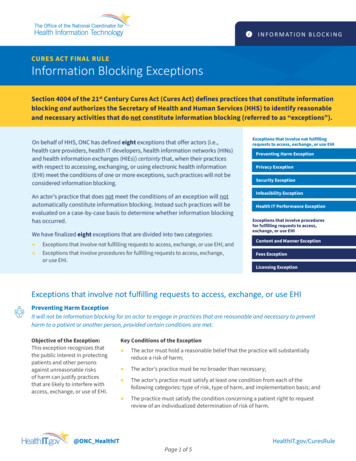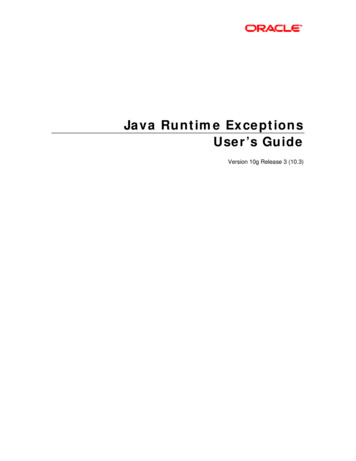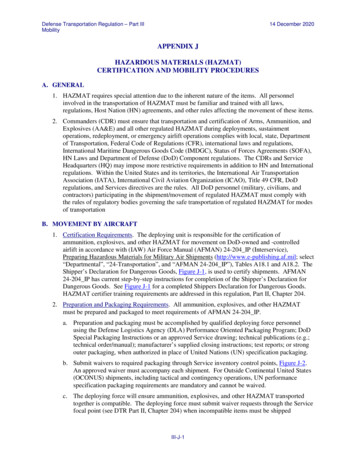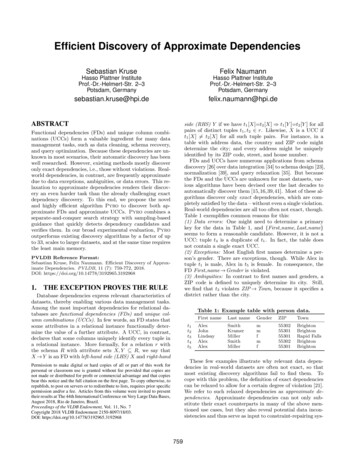
Transcription
I N F O R M AT I O N B L O C K I N GCURES ACT FINAL RULEInformation Blocking ExceptionsSection 4004 of the 21st Century Cures Act (Cures Act) defines practices that constitute informationblocking and authorizes the Secretary of Health and Human Services (HHS) to identify reasonableand necessary activities that do not constitute information blocking (referred to as “exceptions”).On behalf of HHS, ONC has defined eight exceptions that offer actors (i.e.,health care providers, health IT developers, health information networks (HINs)and health information exchanges (HIEs)) certainty that, when their practiceswith respect to accessing, exchanging, or using electronic health information(EHI) meet the conditions of one or more exceptions, such practices will not beconsidered information blocking.An actor’s practice that does not meet the conditions of an exception will notautomatically constitute information blocking. Instead such practices will beevaluated on a case-by-case basis to determine whether information blockinghas occurred.We have finalized eight exceptions that are divided into two categories: Exceptions that involve not fulfilling requests to access, exchange, or use EHI; andExceptions that involve procedures for fulfilling requests to access, exchange,or use EHI.Exceptions that involve not fulfillingrequests to access, exchange, or use EHIPreventing Harm ExceptionPrivacy ExceptionSecurity ExceptionInfeasibility ExceptionHealth IT Performance ExceptionExceptions that involve proceduresfor fulfilling requests to access,exchange, or use EHIContent and Manner ExceptionFees ExceptionLicensing ExceptionExceptions that involve not fulfilling requests to access, exchange, or use EHIPreventing Harm ExceptionIt will not be information blocking for an actor to engage in practices that are reasonable and necessary to preventharm to a patient or another person, provided certain conditions are met.Objective of the Exception:This exception recognizes thatthe public interest in protectingpatients and other personsagainst unreasonable risksof harm can justify practicesthat are likely to interfere withaccess, exchange, or use of EHI.@ONC HealthITKey Conditions of the Exception The actor must hold a reasonable belief that the practice will substantiallyreduce a risk of harm;The actor’s practice must be no broader than necessary;The actor’s practice must satisfy at least one condition from each of thefollowing categories: type of risk, type of harm, and implementation basis; andThe practice must satisfy the condition concerning a patient right to requestreview of an individualized determination of risk of harm.Page 1 of 5HealthIT.gov/CuresRule
Information Blocking ExceptionsPrivacy ExceptionIt will not be information blocking if an actor does not fulfill a request to access, exchange, or use EHI in order to protectan individual’s privacy, provided certain conditions are met.Objective of the Exception:This exception recognizes that ifan actor is permitted to provideaccess, exchange, or use of EHIunder a privacy law, then theactor should provide that access,exchange, or use. However, anactor should not be requiredto use or disclose EHI in a waythat is prohibited under state orfederal privacy laws.Key Conditions of the ExceptionTo satisfy this exception, an actor’s privacy-protective practice must meet at least one ofthe four sub-exceptions:1.Precondition not satisfied: If an actor is required by a state or federal law to satisfya precondition (such as a patient consent or authorization) prior to providingaccess, exchange, or use of EHI, the actor may choose not to provide access,exchange, or use of such EHI if the precondition has not been satisfied undercertain circumstances.2.Health IT developer of certified health IT not covered by HIPAA: If an actor is ahealth IT developer of certified health IT that is not required to comply with theHIPAA Privacy Rule, the actor may choose to interfere with the access, exchange,or use of EHI for a privacy-protective purpose if certain conditions are met.3.Denial of an individual’s request for their EHI consistent with 45 CFR 164.524(a)(1) and (2): An actor that is a covered entity or business associate may deny anindividual’s request for access to his or her EHI in the circumstances providedunder 45 CFR 164.524(a)(1) and (2) of the HIPAA Privacy Rule.4.Respecting an individual’s request not to share information: An actor maychoose not to provide access, exchange, or use of an individual’s EHI if doing sofulfills the wishes of the individual, provided certain conditions are met.Security ExceptionIt will not be information blocking for an actor to interfere with the access, exchange, or use of EHI in order to protect thesecurity of EHI, provided certain conditions are met.Objective of the Exception:This exception is intended tocover all legitimate securitypractices by actors, but doesnot prescribe a maximumlevel of security or dictate aone-size-fits-all approach.@ONC HealthITKey Conditions of the Exception The practice must be:1.Directly related to safeguarding the confidentiality, integrity, andavailability of EHI;2.Tailored to specific security risks; and3.Implemented in a consistent and non-discriminatory manner.The practice must either implement a qualifying organizational security policyor implement a qualifying security determination.Page 2 of 5HealthIT.gov/CuresRule
Information Blocking ExceptionsInfeasibility ExceptionIt will not be information blocking if an actor does not fulfill a request to access, exchange, or use EHI due to theinfeasibility of the request, provided certain conditions are met.Objective of the Exception:This exception recognizes thatlegitimate practical challenges maylimit an actor’s ability to complywith requests for access, exchange,or use of EHI. An actor may nothave—and may be unable toobtain—the requisite technologicalcapabilities, legal rights, or othermeans necessary to enable access,exchange, or use.Key Conditions of the Exception The practice must meet one of the following conditions:» Uncontrollable events: The actor cannot fulfill the request for access,exchange, or use of electronic health information due to a natural orhuman-made disaster, public health emergency, public safety incident,war, terrorist attack, civil insurrection, strike or other labor unrest,telecommunication or internet service interruption, or act of military,civil or regulatory authority.» Segmentation: The actor cannot fulfill the request for access, exchange,or use of EHI because the actor cannot unambiguously segment therequested EHI.» Infeasibility under the circumstances: The actor demonstrates through acontemporaneous written record or other documentation its consistentand non-discriminatory consideration of certain factors that led to itsdetermination that complying with the request would be infeasibleunder the circumstances.The actor must provide a written response to the requestor within 10 businessdays of receipt of the request with the reason(s) why the request is infeasible.Health IT Performance ExceptionIt will not be information blocking for an actor to take reasonable and necessary measures to make health IT temporarilyunavailable or to degrade the health IT's performance for the benefit of the overall performance of the health IT,provided certain conditions are met.Objective of the Exception:This exception recognizes that forhealth IT to perform properly andefficiently, it must be maintained,and in some instances improved,which may require that healthIT be taken offline temporarily.Actors should not be deterredfrom taking reasonable andnecessary measures to makehealth IT temporarily unavailableor to degrade the health IT’sperformance for the benefit of theoverall performance of health IT.Key Conditions of the Exception @ONC HealthITThe practice must:1.Be implemented for a period of time no longer than necessary to achieve themaintenance or improvements for which the health IT was made unavailableor the health IT’s performance degraded;2.Be implemented in a consistent and non-discriminatory manner; and3.Meet certain requirements if the unavailability or degradation is initiated by ahealth IT developer of certified health IT, HIE, or HIN.An actor may take action against a third-party app that is negatively impactingthe health IT’s performance, provided that the practice is:1.For a period of time no longer than necessary to resolve any negative impacts;2.Implemented in a consistent and non-discriminatory manner; and3.Consistent with existing service level agreements, where applicable.If the unavailability is in response to a risk of harm or security risk, the actor mustonly comply with the Preventing Harm or Security Exception, as applicable.Page 3 of 5HealthIT.gov/CuresRule
Information Blocking ExceptionsExceptions that involve procedures for fulfilling requests to access, exchange,or use EHIContent and Manner ExceptionIt will not be information blocking for an actor to limit the content of its response to a request to access, exchange, or useEHI or the manner in which it fulfills a request to access, exchange, or use EHI, provided certain conditions are met.Objective of the Exception:This exception providesclarity and flexibility to actorsconcerning the requiredcontent (i.e., scope of EHI)of an actor’s response to arequest to access, exchange,or use EHI and the mannerin which the actor may fulfillthe request. This exceptionsupports innovation andcompetition by allowingactors to first attempt toreach and maintain marketnegotiated terms for theaccess, exchange, and, useof EHI.Key Conditions of the ExceptionContent Condition: Establishes the content an actor must provide in response to arequest to access, exchange, or use EHI in order to satisfy the exception. 1.Up to 24 months after the publication date of the Cures Act final rule, an actormust respond to a request to access, exchange, or use EHI with, at a minimum, theEHI identified by the data elements represented in the United States Core Data forInteroperability (USCDI) standard.2. On and after 24 months after the publication date of the Cures Act final rule, anactor must respond to a request to access, exchange, or use EHI with EHI as definedin § 171.102.Manner Condition: Establishes the manner in which an actor must fulfill a request toaccess, exchange, or use EHI in order to satisfy this exception.» An actor may need to fulfill a request in an alternative manner whenthe actor is:» Technically unable to fulfill the request in any manner requested; orCannot reach agreeable terms with the requestor to fulfill the request.If an actor fulfills a request in an alternative manner, such fulfillment mustcomply with the order of priority described in the manner condition and mustsatisfy the Fees Exception and Licensing Exception, as applicable.Fees ExceptionIt will not be information blocking for an actor to charge fees, including fees that result in a reasonable profit margin, foraccessing, exchanging, or using EHI, provided certain conditions are met.Objective of the Exception:This exception enables actorsto charge fees related to thedevelopment of technologiesand provision of services thatenhance interoperability,while not protecting rentseeking, opportunistic fees,and exclusionary practicesthat interfere with access,exchange, or use of EHI.Key Conditions of the ExceptionThe practice must:Meet the basis for fees condition.» For instance, the fees an actor charges must: Not be specifically excluded.» For instance, the exception does not apply to: @ONC HealthITBe based on objective and verifiable criteria that are uniformly applied for allsimilarly situated classes of persons or entities and requests.Be reasonably related to the actor’s costs of providing the type of access,exchange, or use of EHI.Not be based on whether the requestor or other person is a competitor,potential competitor, or will be using the EHI in a way that facilitatescompetition with the actor.A fee based in any part on the electronic access by an individual, their personalrepresentative, or another person or entity designated by the individual to accessthe individual’s EHI.A fee to perform an export of electronic health information via the capability ofhealth IT certified to § 170.315(b)(10).Comply with Conditions of Certification in § 170.402(a)(4) (Assurances – certification to“EHI Export” criterion) or § 170.404 (API).Page 4 of 5HealthIT.gov/CuresRule
Information Blocking ExceptionsLicensing ExceptionIt will not be information blocking for an actor to license interoperability elements for EHI to be accessed, exchanged, orused, provided certain conditions are met.Objective of the Exception:This exception allows actorsto protect the value of theirinnovations and chargereasonable royalties inorder to earn returns on theinvestments they have madeto develop, maintain, andupdate those innovations.Key Conditions of the ExceptionThe practice must meet:The negotiating a license conditions: An actor must begin license negotiations with therequestor within 10 business days from receipt of the request and negotiate a licensewithin 30 business days from receipt of the request.The licensing conditions:» Scope of rights» Reasonable royalty» Non-discriminatory terms» Collateral terms» Non-disclosure agreementAdditional conditions relating to the provision of interoperability elements. @ONC HealthITPage 5 of 5HealthIT.gov/CuresRule
satisfy the Fees Exception and Licensing Exception, as applicable. Fees Exception. It will not be information blocking for an actor to charge fees, including fees that result in a reasonable profit margin, for accessing, exchanging, or using EHI, provided certain conditions are met. Objective of the Exception: This exception enables actors










